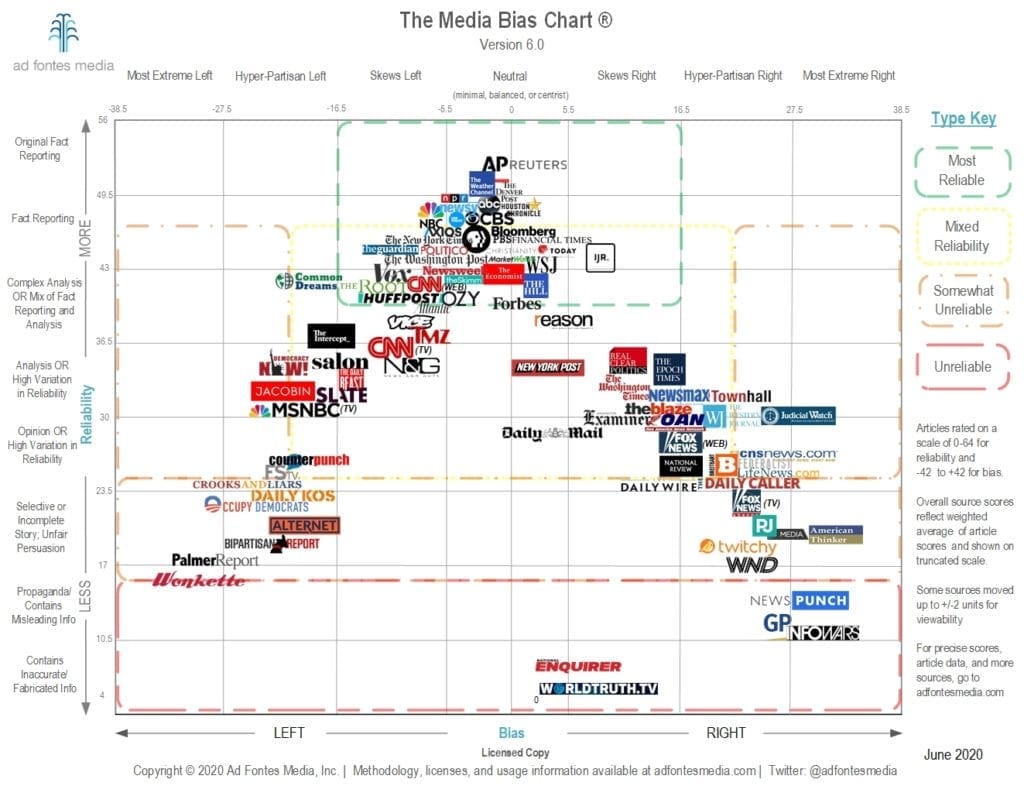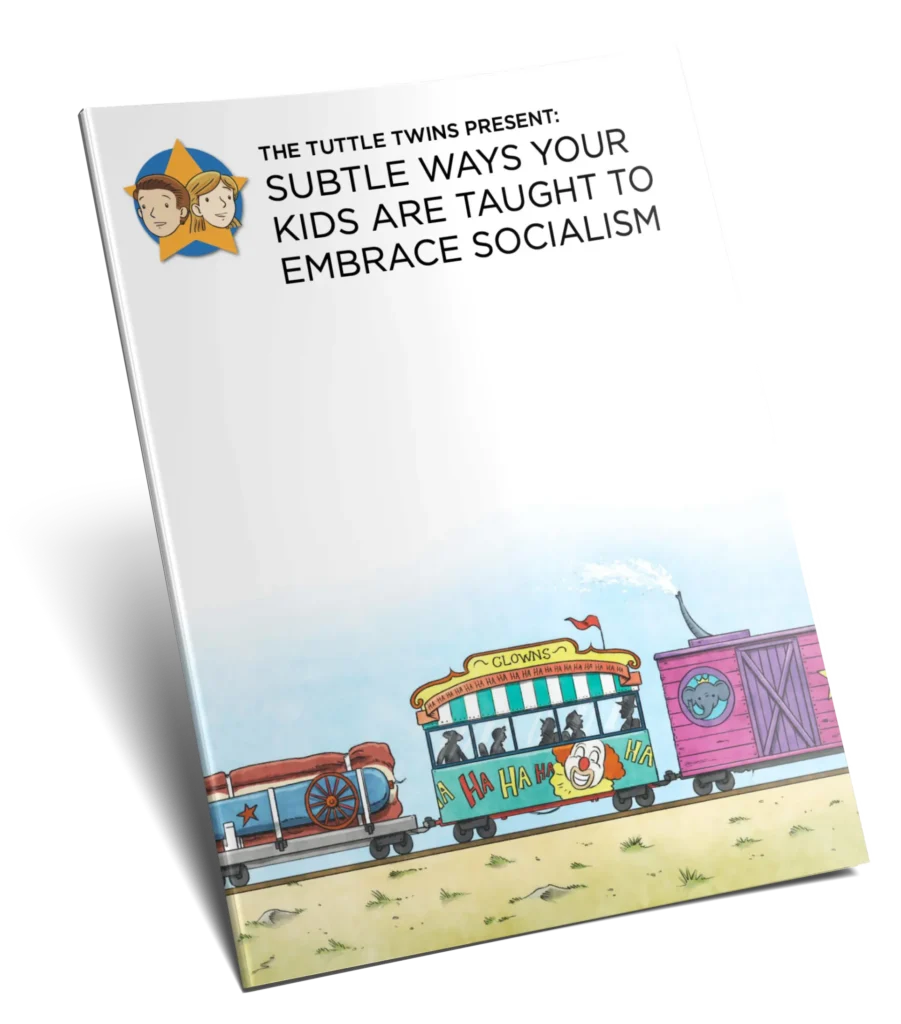SumthinWhittee
Hopefully Santa gives these out this year. Best gift to help counter the elementary school propaganda. #tuttletwins

I think there was a time when journalists actually chased stories and reported on them in an unbiased manner. I don’t know that I’ve ever seen this firsthand—I was born in the early eighties—but I’ve heard whispers that such a time existed.
 For as long as I can remember, we’ve all known which news sources “leaned” which way. There are even charts and graphs that show where you should get your news if you subscribe to this ideology, or that, so that you avoid the discomfort of hearing a spin on the events of the moment that conflict with your personal biases.
For as long as I can remember, we’ve all known which news sources “leaned” which way. There are even charts and graphs that show where you should get your news if you subscribe to this ideology, or that, so that you avoid the discomfort of hearing a spin on the events of the moment that conflict with your personal biases.
I saw an ad on Facebook today for the Wall Street Journal. It simply read, “We Report Both Sides of the Story.” Fully half of the reactions were laughing emojis, and the comments section was about a 50/50 split of praise and mockery. We don’t event try to pretend that unbiased and non-narrative-driven reporting is a thing anymore—it’s crazy.
And yet, even knowing this truth, I still sometimes find myself surprised at just how “selective” reporting can be. Such was the case when I sat down to read this New York Times piece about the collapse of Venezuela. The writing is good, the story is heartbreaking with no detail of the misery and suffering of the people spared:
The decline has diminished beyond recognition a country that just a decade ago rivaled the United States for regional influence. It is also unraveling a national culture defined by oil, a source of cash that once seemed endless; it financed monumental public works and pervasive graft, generous scholarships and flashy shopping trips to Miami.
Crippling gasoline shortages have led to an outbreak of dozens of daily protests across most Venezuelan states in recent weeks.
In the capital, Caracas, periodic fuel shipments from Iran, paid for with the country’s remaining gold reserves, provide a semblance of normality for a few weeks at a time. But in the countryside, residents have defied the pandemic lockdown to block roads and clash with police amid their desperate demands for the modicum of fuel they need to survive.
Across Venezuela’s oil towns, the sticky black crude that once provided jobs and social mobility is poisoning residents’ livelihoods.
In Cabimas, a town on the shores of Lake Maracaibo that was once a center of production for the region’s prolific oil fields, crude seeping from abandoned underwater wells and pipelines coats the crabs that former oil workers haul from the lake with blackened hands.
When it rains, oil that has oozed into the sewage system comes up through manholes and drains, coursing with rainwater through the streets, smearing houses and filling the town with its gaseous stench.
Cabimas’s desolation marks a swift downfall for a town that just a decade ago was one of the richest in Venezuela.
But as I continued to read, I noticed a terrible omission: nowhere—not one time in the entire article—was the word “socialism” used.
How could the NYT make such a mistake? We all—literally anyone who has been paying any kind of attention—know that Venezuela is the news story that it is today because of the rise of a socialist government, the nationalization of industry, and the unavoidable consequences of those two things. It’s not some sad, mysterious, complex puzzle one must reason out—it’s socialism.
Thankfully, I don’t have to write an entire piece pointing out all the omissions (and the questionable integrity of the writers of this piece) because the folks at FEE already tackled it:
This is journalistic malpractice. Sort of like writing about 2020 and not mentioning coronavirus or writing about 1944 and not mentioning World War II.
For those of you who do care about facts, it’s worth knowing that Venezuela has the world’s lowest level of economic liberty according to Economic Freedom of the World and second-to-lowest level of economic liberty according to the Index of Economic Freedom.
Yes! “Journalistic malpractice” is precisely what it is! The article goes on to quote Daniel di Martino’s USA Today column where he details his personal story of the fall of Venezuela:
All my life, I lived under socialism in Venezuela until I left and came to the United States as a student in 2016. Because the regime in charge imposed price controls and nationalized the most important private industries, production plummeted. No wonder I had to wait hours in lines to buy simple products such as toothpaste or flour.
…My family and I suffered from blackouts and lack of water. The regime nationalized electricity in 2007 in an effort to make electricity “free.” Unsurprisingly, this resulted in underinvestment in the electrical grid. By 2016, my home lost power roughly once a week. …The real reason my family went without water and electricity was the socialist economy instituted by dictators Hugo Chavez and Nicolas Maduro. The welfare programs, many minimum-wage hikes and nationalizations implemented by their regimes resulted in a colossal government deficit that the central bank covered by simply printing more money — leading to rampant inflation. …I watched what was once one of the richest countries in Latin America gradually fall apart under the weight of big government.
It would have been really great if the New York Times had, ya know, reached out to people who watched Venezuela collapse because of their socialist government for some insight into how Venezuela collapsed. That seems like a pretty “journalist” thing to do…
But what do I know? I just write kids books. 😉
 Here’s the problem with stories being written like this: Young people are going to read them and they’re going to learn about the fall of Venezuela, but they are going to not ever connect socialism and massive, centrally planned government, with that fall. And so, when they think about Venezuela, they might think, “Oh… that was a really sad story. Those poor people,” but they won’t connect that sad story to the policies and programs that candidates in their own country are promising to implement if they are elected!
Here’s the problem with stories being written like this: Young people are going to read them and they’re going to learn about the fall of Venezuela, but they are going to not ever connect socialism and massive, centrally planned government, with that fall. And so, when they think about Venezuela, they might think, “Oh… that was a really sad story. Those poor people,” but they won’t connect that sad story to the policies and programs that candidates in their own country are promising to implement if they are elected!
We have to teach our kids about socialism and the impact that socialistic policies always have on the people of the countries where they are installed. What happened to Venezuela wasn’t some random oddity that can’t be explained—it’s what has happened (and will continue to happen) to every country that ever votes itself into socialism.
Pretty much every negative piece that so-called “progressives” write targeting The Tuttle Twins books mentions Ayn Rand. “Look, some terrible person wrote a kids version of terrible-human Ayn Rand’s Atlas Shrugged,” they say. The Tuttle Twins and the Search for Atlas teaches truth about the selfishness of socialism and the virtue of merit-based reward, so it’s pretty easy to see why it grates on the nerves of the “takers.” It even takes a segue through life in soviet Russia when the circus calliope player is  reminded of breadlines and suffering in his native Russia—something that Rand was more than qualified to write about considering her family lost everything and nearly starved to death under Lenin.
reminded of breadlines and suffering in his native Russia—something that Rand was more than qualified to write about considering her family lost everything and nearly starved to death under Lenin.
Socialists hate the truth about socialism getting out. They want to paint it as friendly and virtuous and all about “sharing” and “compassion,” so those of us who know the truth have to speak up. We need to be tireless in our mission to educate the next generation and to tell the truth about socialism (and call out lies about it) whenever we have the chance.
I don’t want to live through a Venezuela, and I don’t want my kids to ever have to experience the things that inspired people like Ayn Rand and Daniel di Martino to write in warning to the rest of us.
I choose freedom and prosperity—for myself, and my kids.
— Connor

There are many subtle ways that socialist ideas are being introduced, taught, and reinforced directly to your children.
Our e-book walks through several examples to help raise your attention to this agenda so you can help your children avoid being indoctrinated to support the state.
Hopefully Santa gives these out this year. Best gift to help counter the elementary school propaganda. #tuttletwins
When ur bedtime story teaches ur girl about the federal reserve & what a crock of crap it is. Vocab words: Medium of exchange & fiat currency. #tuttletwins for the win
“My just-turned-5 year old told me he is planning to read all the #TuttleTwins books today. It’s 10AM on Saturday and he’s already on his third. #Homeschooling ftw.”